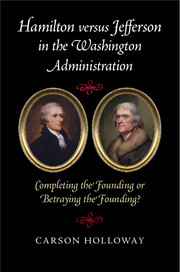 Hamilton versus Jefferson in the Washington Administration
Hamilton versus Jefferson in the Washington Administration 1 - Introduction
Published online by Cambridge University Press: 05 November 2015
Summary
By the middle of 1792, just a little more than three years after America's new government under the Constitution had been set in motion, Alexander Hamilton and Thomas Jefferson – President George Washington's two most important cabinet secretaries and two of the most eminent men among the American founders–had become open and bitter political enemies. According to Jefferson, Hamilton was “a man whose history, from the moment at which history can stoop to notice him, is a tissue of machinations against the liberty of the country which has not only received him and given him bread, but heaped its honors on his head.” According to Hamilton, Jefferson, who had taken such pains to present himself “as the quiet, modest, retiring philosopher,” was in reality an “intriguing incendiary,” an “aspiring turbulent competitor,” and “a man who is continually machinating against the public happiness.”
As these remarks indicate, the dispute was not personal but political. It was, moreover, political not in the ordinary sense but in the highest sense of the word. Hamilton and Jefferson may have felt a personal political rivalry over who would exert the greatest influence over administration policy, but this was neither man's deepest concern. Rather, each believed that the debate between them was over regime principles. Each believed that he was protecting the newly established republic, and that the other was laboring to destroy it.
As secretary of the treasury, Hamilton devised and promoted an ambitious policy agenda that began with a plan to provide not only for the Revolutionary War debt of the national government but also for much of the state debt as well; proceeded to call for the creation of a national bank; and concluded by proposing a system of government support for American manufacturing. Hamilton regarded these policies as essential to completing the American founding by delivering on the Constitution's promise of energetic government, which Hamilton believed was necessary to safeguard the Union.
For his part, Jefferson believed that Hamilton's treasury program was not only ill advised but positively (and, indeed, intentionally) dangerous to the character of the American regime itself.
- Type
- Chapter
- Information
- Hamilton versus Jefferson in the Washington AdministrationCompleting the Founding or Betraying the Founding?, pp. 1 - 6Publisher: Cambridge University PressPrint publication year: 2015


